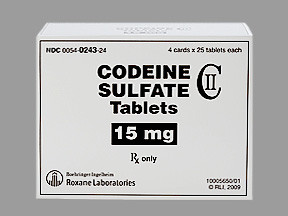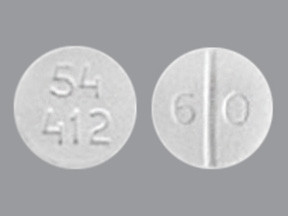CODEINE - ORAL
PHONETIC PRONUNCIATION: (KOE-deen)
GENERIC NAME(S): codeine sulfate
Uses
USES: See also Warning section. This medication is used to help relieve mild to moderate pain. Codeine belongs to a class of drugs known as opioid (narcotic) analgesics. It works in the brain to change how your body feels and responds to pain.
How to use CODEINE - ORAL
HOW TO USE: Read the Medication Guide provided by your pharmacist before you start taking codeine and each time you get a refill. If you have any questions, ask your doctor or pharmacist. Take this medication by mouth as directed by your doctor. You may take this drug with or without food. If you have nausea, it may help to take this drug with food. Ask your doctor or pharmacist about other ways to decrease nausea (such as lying down for 1 to 2 hours with as little head movement as possible). If you are using the liquid form of this medication, carefully measure the dose using a special measuring device/spoon. Do not use a household spoon because you may not get the correct dose. The dosage is based on your medical condition and response to treatment. For children, the dosage is also based on weight. Do not increase your dose or use this drug more often or for longer than prescribed, because your risk of side effects may increase. Properly stop the medication when so directed. Pain medications work best if they are used as the first signs of pain occur. If you wait until the pain has worsened, the medication may not work as well. If you have ongoing pain (such as due to cancer), your doctor may direct you to also take long-acting opioid medications. In that case, this medication might be used for sudden (breakthrough) pain only as needed. Other pain relievers (such as acetaminophen, ibuprofen) may also be prescribed. Ask your doctor or pharmacist about using codeine safely with other drugs. Suddenly stopping this medication may cause withdrawal, especially if you have used it for a long time or in high doses. To prevent withdrawal, your doctor may lower your dose slowly. Tell your doctor or pharmacist right away if you have any withdrawal symptoms such as restlessness, mental/mood changes (including anxiety, trouble sleeping, thoughts of suicide), watering eyes, runny nose, nausea, diarrhea, sweating, muscle aches, or sudden changes in behavior. When this medication is used for a long time, it may not work as well. Talk with your doctor if this medication stops working well. Though it helps many people, this medication may sometimes cause addiction. This risk may be higher if you have a substance use disorder (such as overuse of or addiction to drugs/alcohol). Take this medication exactly as prescribed to lower the risk of addiction. Ask your doctor or pharmacist for more details. Tell your doctor if your pain does not get better or if it gets worse. If you are taking codeine to control a cough, tell your doctor if your cough does not get better in 5 days or if your condition gets worse.
Side Effects
Precautions
Interactions
Overdose
Images

- color
- white
- shape
- round
- imprint
- 15, 54 613

- color
- white
- shape
- round
- imprint
- 6 0, 54 412
Reviews
Faq for CODEINE - ORAL
Codeine oral is a medication that belongs to a class of drugs known as opioids. It is used to treat mild to moderately severe pain.
Codeine oral works by binding to opioid receptors in the brain and spinal cord, blocking the perception of pain.
Common side effects of codeine oral may include drowsiness, constipation, nausea, vomiting, and dizziness.
Yes, codeine oral has a potential for addiction and abuse, especially with prolonged or improper use. It is important to take codeine oral only as prescribed by a healthcare professional.
Before using codeine oral, you should inform your healthcare provider if you have a history of substance abuse, respiratory disorders, liver or kidney disease, or if you are pregnant or breastfeeding.
Codeine oral is generally not recommended for use in children, especially those under the age of 12, due to the risk of serious side effects.
Codeine oral can interact with other medications, such as antidepressants, sedatives, and certain antibiotics. It is important to inform your healthcare provider about all the medications you are currently taking.
Codeine oral should be taken exactly as prescribed by your healthcare provider. It can be taken with or without food, and should be swallowed whole with a full glass of water.
If you miss a dose of codeine oral, take it as soon as you remember. However, if it is close to the time for your next dose, skip the missed dose and continue with your regular dosing schedule.
- Codeine is commonly used to relieve mild to moderate pain. It is also used as a cough suppressant.
- Codeine works by binding to certain opioid receptors in the brain, which then blocks the transmission of pain signals. It also reduces the activity in the part of the brain that controls the cough reflex.
- Common side effects of codeine include drowsiness, constipation, dizziness, nausea, vomiting, and itching. It may also cause respiratory depression, especially when taken in high doses.
- Yes, codeine has addictive properties, especially if used for a prolonged period or in high doses. It belongs to the class of opioid medications, which have a high potential for dependence and abuse.
- Codeine has a half-life of about 3-4 hours. It can generally be detected in urine for up to 2-3 days after the last dose, but this may vary depending on various factors.
- Yes, codeine should be used with caution in individuals with a history of drug or alcohol abuse, respiratory conditions, liver or kidney problems. It can interact with certain medications, so it's important to inform your healthcare provider about all the medications you are taking.
- Codeine should be used with caution during pregnancy as it can cross the placenta and affect the developing baby. It may also pass into breast milk and can cause drowsiness or breathing problems in nursing infants. It's important to consult a healthcare provider before using codeine in these situations.
- Codeine is a prescription medication in most countries. However, in some countries, it may be available over the counter in combination with other ingredients, such as acetaminophen or ibuprofen.
- If you miss a dose of codeine, take it as soon as you remember, unless it is close to the time of your next scheduled dose. Do not double the dose to make up for a missed one.
Warning
WARNING: Codeine has a risk for abuse and addiction, which can lead to overdose and death. Codeine may also cause severe, possibly fatal, breathing problems. To lower your risk, your doctor should have you take the smallest dose of codeine that works, and take it for the shortest possible time. See also How to Use section for more information about addiction. The risk for severe breathing problems is higher when you start this medication and after a dose increase, or if you take the wrong dose/strength. Taking this medication with alcohol or other drugs that can cause drowsiness or breathing problems may cause very serious side effects, including death. Also, other medications can affect the removal of codeine from your body, which may affect how codeine works. Be sure you know how to take codeine and what other drugs you should avoid taking with it. See also Drug Interactions section. Get medical help right away if any of these very serious side effects occur: slow/shallow breathing, unusual lightheadedness, severe drowsiness/dizziness, difficulty waking up. Keep this medicine in a safe place to prevent theft, misuse, or abuse. If someone accidentally swallows this drug, get medical help right away. Before using this medication, women of childbearing age should talk with their doctor(s) about the risks and benefits. Tell your doctor if you are pregnant or if you plan to become pregnant. During pregnancy, this medication should be used only when clearly needed. It may slightly increase the risk of birth defects if used during the first two months of pregnancy. Also, using it for a long time or in high doses near the expected delivery date may harm the unborn baby. To lessen the risk, take the smallest effective dose for the shortest possible time. Babies born to mothers who use this drug for a long time may develop severe (possibly fatal) withdrawal symptoms. Tell the doctor right away if you notice any symptoms in your newborn baby such as crying that doesn't stop, slow/shallow breathing, irritability, shaking, vomiting, diarrhea, poor feeding, or difficulty gaining weight. Children younger than 12 years should not use products that contain codeine. Children between 12 and 18 years old should not use codeine after certain surgeries (including tonsil/adenoid removal). Also, codeine use is not recommended for children between 12 and 18 years old who are obese or have breathing problems. Some children are more sensitive to codeine and have had very serious (rarely fatal) breathing problems such as slow/shallow breathing (see also Side Effects section). Talk with your doctor or pharmacist about the risks and benefits of this medication.
Disclaimer
IMPORTANT: HOW TO USE THIS INFORMATION: This is a summary and does NOT have all possible information about this product. This information does not assure that this product is safe, effective, or appropriate for you. This information is not individual medical advice and does not substitute for the advice of your health care professional. Always ask your health care professional for complete information about this product and your specific health needs.


No Reviews Yet